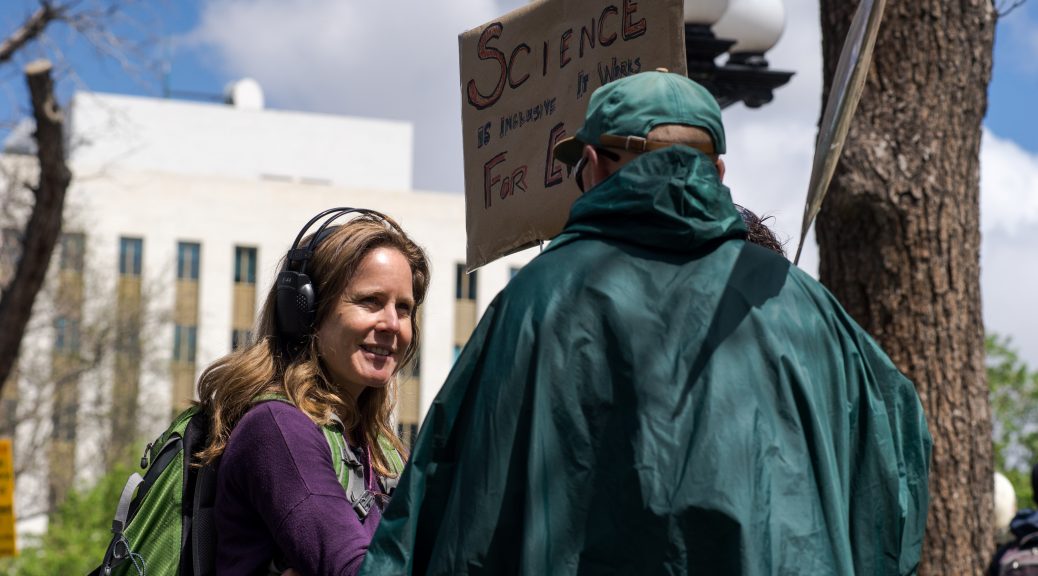Amy Martin: A Paradigm-Shifting Conversation
By Benjamin Alva Polley
Photos by Nick Mott
Amy Martin is the creator and producer of the new podcast, Threshold, featuring deep dives into big moments of environmental change. Each series explores a complex environmental question through intimate stories from people on all sides of an issue. The first series asks if we can ever have wild, free-roaming bison in the United States again.
Amy’s stories have been heard on NPR’s All Things Considered, Montana Public Radio, and many other outlets. In 2015, she was selected to give a TEDx talk on the concept of listening as a survival tool. Raised on an Iowa farm, Martin has lived in Montana since 1999. She is currently a Scripps Fellow at Colorado University in Boulder studying environmental journalism.
She spoke with Ben Polley on March 20, 2017. The interview has been edited for flow and content.
Benjamin Polley: I love the podcast. I think more people need to know about issues facing wildlife and the natural world.
Amy Martin: Thanks for listening to it. I always believe in talking to the people who are closest to an issue. But I really do feel like a big motivation for the series was trying to get people to understand why we named them our national mammal for a reason. They used to roam not just across the entire United States, but across North America. Yellowstone bison are held in trust for the people of the United States and this is a national issue. It is easy for people in other places to be like, “Crazy Montanans can’t figure their shit out.” [laughter] But, it is not just a Montana issue.
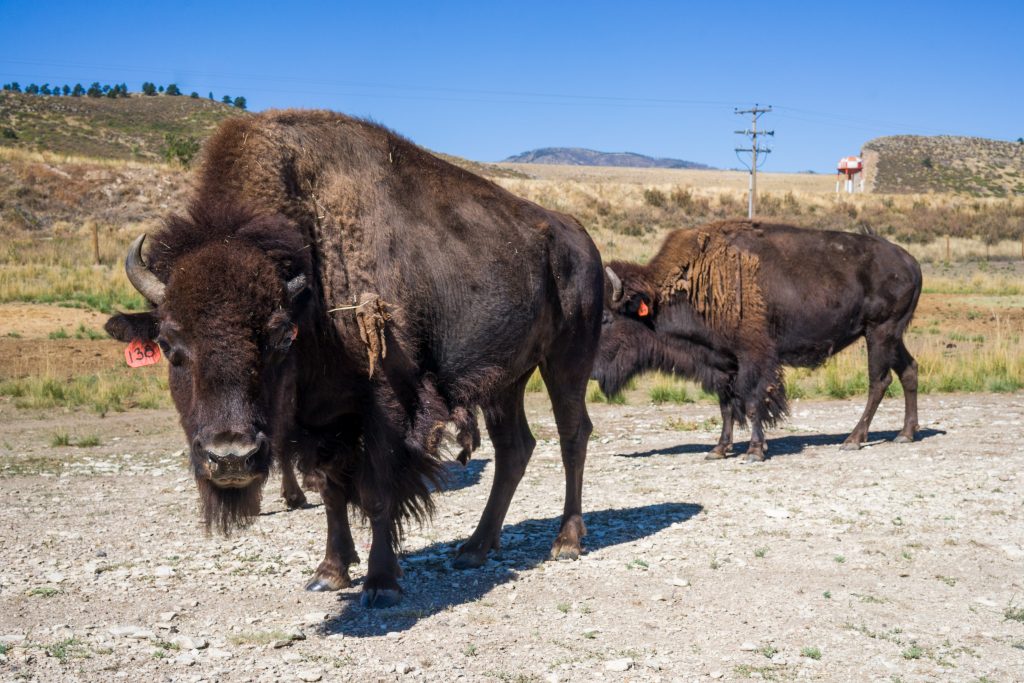
BP: You grew up on a farm in Iowa. What part of Iowa are you from?
AM: I am from way eastern Iowa. I grew up on a tiny farm outside of a tiny town called Preston, which I am sure you have not heard of. An hour south of Dubuque and an hour north of the quad cities.
BP: Did your farm have livestock on it that helped you connect to wildlife and the natural world?
AM: We had sheep on our farm and we always had cats and dogs. I am not sure about the connection between livestock and wildlife, but I can say I got turned on by animals. The way you deal with livestock—and especially as a child—you get indoctrinated early into some of the core complexities of being a living being on the planet with others. And in order to live, other living beings have to die.
It was hard for me because I absolutely loved our sheep. They were living right next to us in the barn next to the house and in the pasture all around us. So, they were like part of the family in a way. It was really hard for me when we had to sell the lambs every year. There were all kinds of beautiful and intense things like helping during lambing season and watching new life come in. And then a certain percentage of them are stillborn or they die after they are born or their moms die and they have to be grafted. Or there are times when some horrible thing would happen or a ram would get loose and he would injure a few of his own lambs because rams are complete jerks to their own children in a weird way.
So, we had to take care of injured ones and we had some that didn’t make it from that. So dealing with all the nitty-gritty life and death stuff at a really young age was hard and yet, I am so grateful for it. I think and feel it really shaped me.
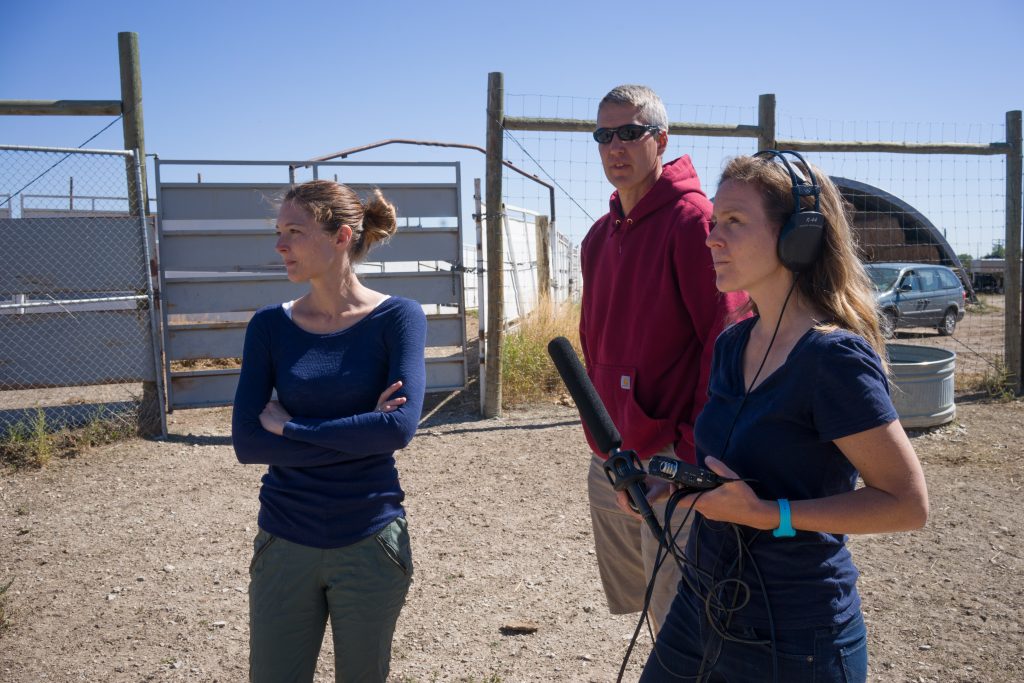
BP: Did you also take part in the slaughter?
AM: The way that most commercial livestock operations work is you market lambs or cows and they get taken to a professional slaughterhouse. So selling for me meant seeing them loaded onto a truck and never seeing them again and knowing they were going to die. I didn’t directly kill any of the animals, but there were times I was involved when a ewe was injured and my dad had to put her down because she was in misery. I mean literally take a gun and shoot her. He would shield me from that. I wasn’t going to stand there and watch their brains get blown out. But, I could hear the gunshot. I knew what was going on. Yeah, it was intense.
BP: How did you come up with the name Threshold for your podcast?
AM: I knew I wanted to do an in-depth documentary style show that dealt with issues from the natural world. I knew I didn’t want to use the word “environment.” I didn’t want to use the word “nature.” I think what is interesting about the natural world is that everything is always in a process of change. All of these relationships with all of these different aspects are full of dynamism. And that is what makes it difficult and beautiful. But, I didn’t want to use the word change—people will think climate change. Of course, I am interested in climate change, but the show is not exclusively about climate change.
BP: That would turn off a lot of people.
AM: Exactly! I was thinking about words that evoke change. And also had some intensity to it. I was thinking about the word “cusp” a lot. It is a cool word, but it really sucks for radio. Anytime you have an ‘s’ or sibilant sound and a ‘p’ or plosive ‘p’ pop sound together, it makes a spitting sound. [laughter] It is also kind of a dead word. It has the long ‘uh’ and it is one syllable. I was just playing around with a lot of different words that evoke that feeling of being on a cusp or imminent change. I think I made a good choice.
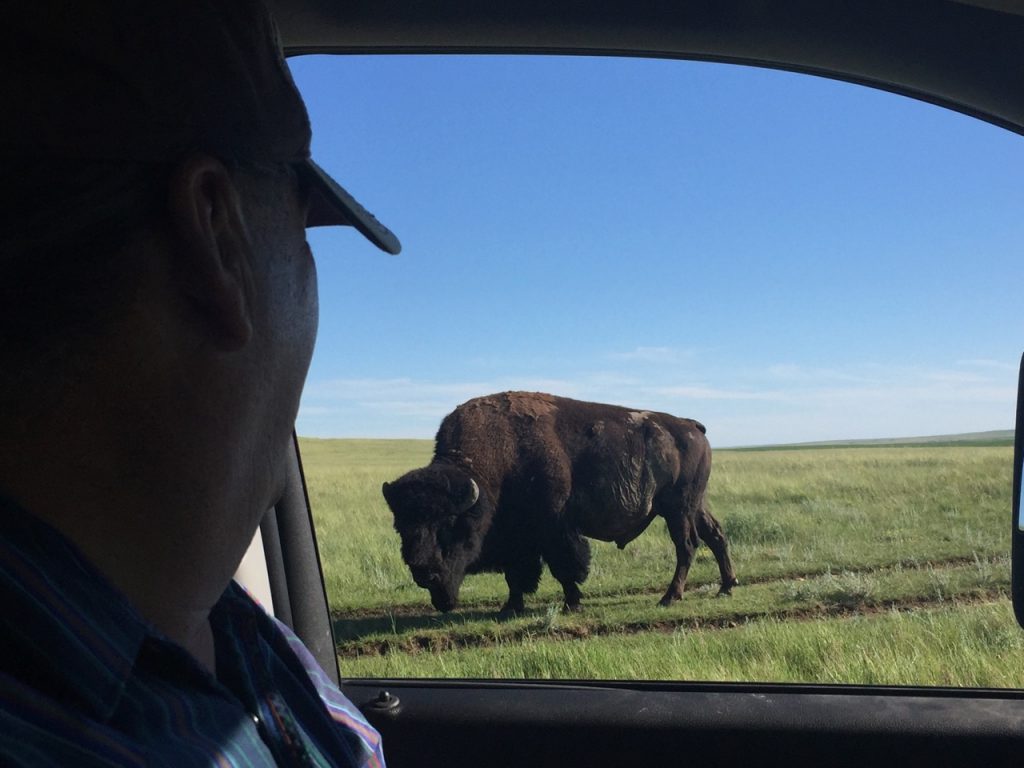
BP: I like it. It was a great call and definitely works better than ‘cusp.’ [laughter]
AM: Yeah, cusp sucks anyways. [laughter]
BP: When you came to our class [at the University of Montana where Ben was doing graduate work], you said you had a problem with the words ‘environmental journalism.’ Professor Frank and you both had problems with that. Can you go into detail about that?
AM: Matt’s email to me was “do you want to come speak to our class about the topic of why environmental journalism sucks?” [laughter] I was like, ah…well… yeah.
Let’s define that a little bit. There are all kinds of problems with the word ‘environment’ in my mind. It immediately presumes that there is a human world and then there is this other thing called the ‘environment.’ We need to think about the ways the human world is part of and influenced by the environment. We have to try to stitch those things back together. How do we stitch the human world and the environment back together? In reality they were never separated except for in language and in our minds.
The way we think and the way we use words have a huge impact on how we act and how things happen in the world. Going way back in the English language before the colonization of North America, this fragmentation happened. I am not enough of a linguist to pinpoint the roots, but I know it is pre-colonial. I think that means that the Europeans brought with them this assumption that there are humans and then there are all of these other things that is everything else that is nature, the environment. That has real world policy implications.
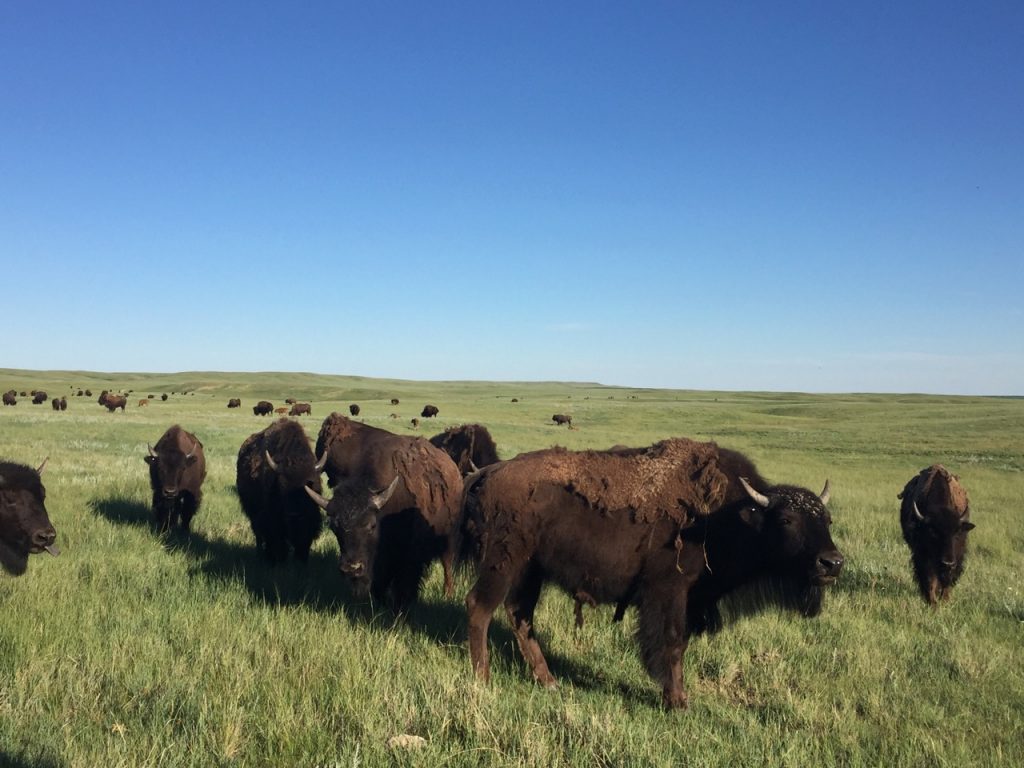
How many times have we heard this debate: “So do you like polar bears or do you like people? Do we want environment or do we want jobs?” The truth is, so many of these arguments are falsely dichotomized and then we spend all of this energy to argue which side of the dichotomy is more important. When a much more sane frame on the whole thing is how do we create policies and frameworks for solving our problems, understanding that we cannot solve human problems without the environment.
It is so hard to even talk about human problems without solving environmental problems. Again, it presumes this distinction that we are separate instead of realizing humans are embedded in this larger system called the environment. Trying to solve one without solving the other is like chasing our tail. We are never going to get anywhere. That is only issue number one with the word. I could go on and on with the word. [laughter]
BP: I completely agree with you that when you use the word environment and nature it separates us from it. We are never going to get to the root of the problem if we continue separating them in our minds.
AM: I think that is at the crux of where we are with our so-called environmental problem. It is almost impossible to see outside of it because of our language. Our dichotomy and our separation is so embedded in our language and therefore our thinking. Language is this veneer that is pasted on top of our thinking. It is a representation of our thinking, individually and collectively. Because we don’t have a language that allows us to think about these cohesive wholes, our societies are structured to not keep them intact.
If we don’t call attention to this way of thinking that is deeply flawed, then we will keep perpetuating the same problems. The problems we are facing are to such a degree that we need a major paradigm shift. Reorganizing the paradigm can bring a lot more people into the conversation and restructure some of the battle lines or even break some of the battle lines down.
BP: How did you get interested in interspecies communication?
AM: I have been interested in it ever since I was a kid. I was trying to write this novel where this one sheep was the protagonist. I had this feeling of wanting to get inside their world from a really young age. I am not special in this way. That is completely human.
BP: I think imagination is the only way forward to fixing this environmental breakdown.

AM: The presumption that we cannot communicate across species comes from the worldview that says there is this human world and then there is this animal world or the environment outside of us. All kinds of cultures throughout time have included myths and stories about people communicating across boundaries of species. It doesn’t have to be like some woo-woo New Age thing. It is just part of being a living creature on this planet that species are interacting with each other across species boundaries in all kinds of ways.
It doesn’t mean we are reading each other’s thoughts or completely understand what is going on in each other’s minds. The birds outside my window are not making noise because there is a huge construction truck making a whole lot of noise instead. That is interspecies communication or interruption of interspecies communication. We are all in this thing together. I am really interested in the scientists that are taking that to another level and saying beyond metaphor what is actually possible here.
BP: Well, it seems like humanity wouldn’t be here, at this point in evolution, if it wasn’t for interspecies communication helping us get this far in the first place.
AM: Exactly! We have been following the ravens to figure out where the carcasses are that we can eat. It is actually a weird paradigm to think that we aren’t trying to pay attention to what other species are doing and saying. That doesn’t make any sense. It is bad survival technique.
BP: What made you choose the medium of a podcast to get your message out rather than writing?
AM: I have always loved radio. I listened to NPR growing up on the farm. I am very auditory. I remember things better when I hear them than when I read them.
BP: Is there a reason you chose bison as the topic for season one?
AM: I have been interested in bison issues ever since I moved to Montana. I have also been frustrated in how they are covered in the news. Year after year, there is some activist in the news who loves bison and here is a rancher who hates bison and end of story. I also chose it because Threshold is a national show in my mind. I felt I needed to start with something I know and something in my backyard, even though Montana is a pretty huge backyard.
My agenda is to have a better conversation. This is not advocacy. This is not an advocacy show. I am not interested in that. I have no interest in listening to advocacy myself, even though it is important. That is not going to hold me for six or seven episodes per season.
BP: Or your audience for that matter?
AM: It is not where the juices are for me. I want to have a better conversation. I want to bring people together to think out loud together who normally would scream at each other on Facebook or would completely ignore each other. I want a space for taking people seriously on all sides of an issue. I was really seeking people and situations where whoever I found would all have a chance to show their best selves, both in terms of being able to make the strongest arguments for their side, but also letting us see them as human beings. I want to make a space where we can get to know each other across some of these divides. I don’t have any illusions that we are just going to walk away and hold hands at the end of the day.
BP: And sing Kumbaya. [laughter]
AM: Exactly! I think there is a place for learning about and respecting where people are coming from. Also, holding strongly to what we learn about and develop an opinion about. It doesn’t have to devolve into this kind of hatred that is getting spewed around right now. So, that is my agenda—to have a smarter, deeper and more empathetic conversation. I am a professional listener and I think the more people can sit down together, we will realize there is a lot more goodness out there in people that transcends a lot of the negativity that is happening right now.
BP: Perfect! That is definitely what the world needs is more deep listening and pausing. It is a lost art we need to practice. An old native proverb is we have two ears and one mouth so we should listen twice as much as we speak.
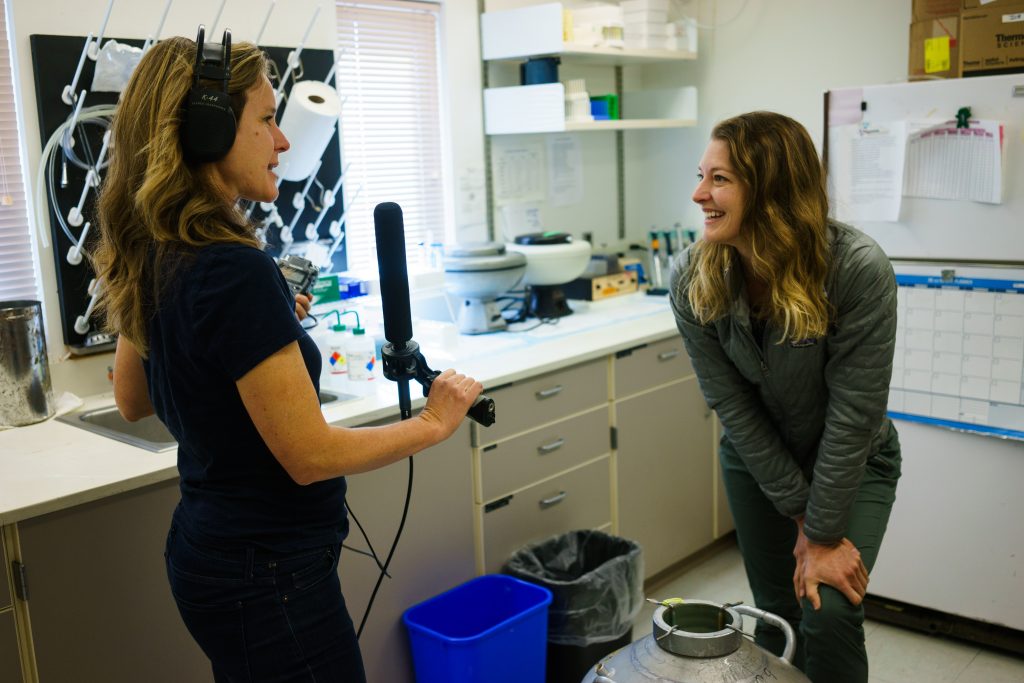
AM: Exactly!
BP: What is some of the feedback you are getting from the podcasts?
AM: Honestly, it has been a total delight. We are getting a lot of fun comments. One that just makes my heart sing came the first week was, “This is the Serial of the natural world.” [laughter] And I was like yes!
I think my favorite one was a guy in Australia that said, “I will fight anyone who doesn’t love this podcast.” [laughter] I said, we might have to put that on a tee shirt. And he said, “Yes, I will finally be a published writer.” [laughter]
I really think of it as a season, as an album, not just a song. I feel like the people who are finding it are passionate and committed. We have gotten people who are angry about this or that—and that is expected. I welcome it. We are trying to respond to everything. No one has written me anything that made me feel like, oh my god, I completely missed that. We are dealing with some intense stuff, so sometimes that evokes intense feelings.
Listen to Threshold.
Benjamin Alva Polley just completed his graduate degree in Environmental Science and Natural Resource Journalism from the University of Montana. During this time he earned an “Outstanding Graduate Career Award.” His work has been published in Esquire, Sierra, Bugle, Canoe & Kayak, Lake Superior Magazine, Earth Island Journal, Flathead Living, Whitefish Review, Written River, Literary Orphans, The Avocet, Black Heart Journal, Montana Headwall, and many other publications. He is also one of the senior editors of Whitefish Review.

